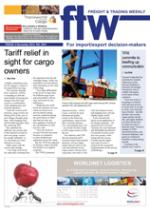Good news for shippers of
containerised cargo and motor
vehicles is that they can look
forward to relief from high
port charges next year when
the new schedule of port
tariffs is implemented.
This will be contained in
cargo discounts proposed by
the Transnet National Port
Authority (TNPA) tariff
application for next year, but
still to be approved by the SA
Ports Regulator. It can be seen
as a follow-up to this financial
year’s R1 billion in container
and motor vehicle export
discounts.
This reduction of container
and automotive tariffs was
warmly welcomed by the
Cape Chamber of Commerce
and Industry.
“Last year, the chamber
produced evidence that SA
port tariffs for container
traffic were three times as
high as those in most other
international ports, and that
Transnet had used the ports
as a cash cow,” said deputy
president, Gordon Metter.
“We are now delighted to see
that the new application by
the TNPA to the SA Ports
Regulator reflects a new and
more sensible approach.
“Even if all the decreases
are approved we will still be
a country with some of the
highest port tariffs in the
world, but at least things are
moving in the right direction
now.”
According to the TNPA,
the outcome of its pricing
strategy clearly indicated that
import and export container
and automotive cargo tariffs
needed to be reduced, whilst
those of other commodities –
particularly bulk commodities
such as coal and iron –
needed to be increased.
This is aligned with the
Regulator, who has recently
been quoted as saying that
iron ore and coal tariffs are
“far cheaper than the rest of
the world”.
In addition, the authority
noted that tariffs for
containers and automotives
were too high, which, it
acknowledged, prompted
the R 1-bn export discount
programme for 2012/13.
It therefore proposed to
reduce the 2013/14 tariffs
for full container exports
and imports and automotive
exports, and “partly enable”
this by increasing the
minimum tariffs for break
bulk and dry bulk cargo.
The TNPA wants to
increase most tariffs by 5.4%
– in line with inflation. But
full container exports will be
reduced by 43.2% over the
2012/13 tariff book charges
(before application of the
R1-bn discount), with 20-foot
containers rated at R614 and
40-ft at R1 228.
For full box imports a
14.3% discount is to be
applied, with 20-ft boxes
rated at R1 866 and 40-ft) at
R3 731.
For motor vehicles (on
wheels) the average tariff will
be R315.12, a reduction of
26.7%.
This will be partly
compensated by upward
adjustment to the tariffs for
breakbulk and bulk export
cargoes.
Breakbulk exports of
cement and clinker R will face
an increase of 36.1% over the
2012/13 tariff book rate, from
R4.41/tonne to R6.00/t, while
coal will go up by 104.1%,
from R2.94/t to R6.00/t.
Dry bulk exports of coal,
by 104.1%, from R2.94/t to
R6.00/t; of cement and clinker
R by 36.1%, from R4.41/t to
R6.00/t; ores and minerals
magnetite R by 104.1%, from
R2.94/t to R6.00/t; chrome ore
R by 13.2%, from R5.30/t to
R6.00/t; and sulphur by 7.1%,
from R5.60/t to R6.00/t.
All other dry bulk
commodities will also be
rated at R6.00/t.
CAPTION
Tariffs for full container exports will be reduced by 43.2% over the
2012/13 tariff book charges.

